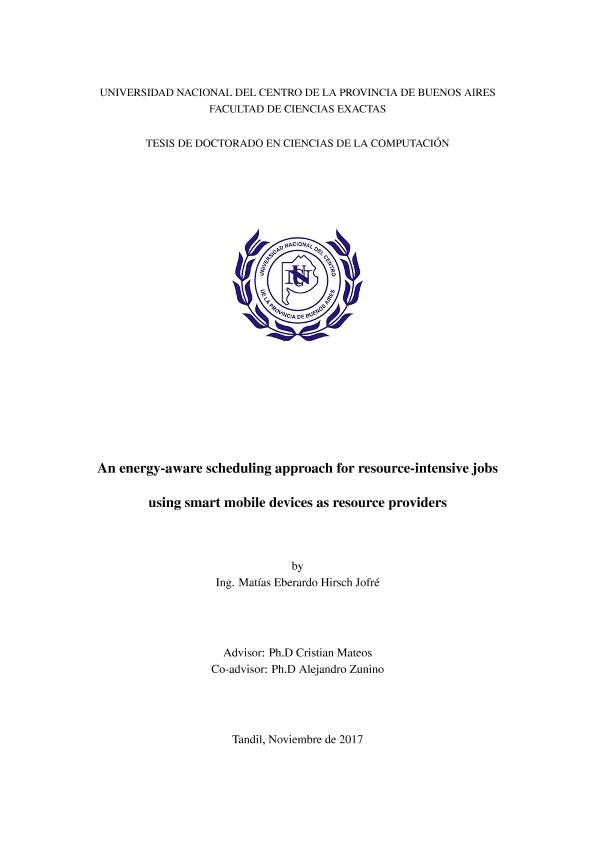Tesis doctoral
Un Enfoque Centrado en el Consumo Energético para la Planificación de Tareas Recurso-Intensivas Empleando Dispositivos Móviles como Proveedores de Recursos
Título:
An energy-aware scheduling approach for resource-intensive jobs using smart mobile devices as resource providers
Hirsch Jofré, Matías Eberardo

Director:
Mateos Diaz, Cristian Maximiliano

Codirector:
Zunino Suarez, Alejandro Octavio

Fecha de publicación:
28/03/2018
Idioma:
Inglés
Clasificación temática:
Resumen
The ever-growing adoption of smart mobile devices is a worldwide phenomenon that positions smart-phones and tablets as primary devices for communication and Internet access. In addition to this, the computing capabilities of such devices, often underutilized by their owners, are in continuous improvement. Today, smart mobile devices have multi-core CPUs, several gigabytes of RAM, and ability to communicate through several wireless networking technologies. These facts caught the attention of researchers who have proposed to leverage smart mobile devices aggregated computing capabilities for running resource intensive software. However, such idea is conditioned by key features, named singularities in the context of this thesis, that characterize resource provision with smart mobile devices.These are the ability of devices to change location (user mobility), the shared or non-dedicated nature of resources provided (lack of ownership) and the limited operation time given by the finite energy source (exhaustible resources).Existing proposals materializing this idea differ in the singularities combinations they target and the way they address each singularity, which make them suitable for distinct goals and resource exploitation opportunities. The latter are represented by real life situations where resources provided by groups of smart mobile devices can be exploited, which in turn are characterized by a social context and a networking support used to link and coordinate devices. The behavior of people in a given social context configure a special availability level of resources, while the underlying networking support imposes restrictionson how information flows, computational tasks are distributed and results are collected. The latter constitutes one fundamental difference of proposals mainly because each networking support ?i.e., ad-hoc and infrastructure based? has its own application scenarios. Aside from the singularities addressed and the networking support utilized, the weakest point of most of the proposals is their practical applicability. The performance achieved heavily relies on the accuracy with which task information, including execution time and/or energy required for execution, is provided to feed the resource allocator.The expanded usage of wireless communication infrastructure in public and private buildings, e.g., shoppings, work offices, university campuses and so on, constitutes a networking support that can be naturally re-utilized for leveraging smart mobile devices computational capabilities. In this context, this thesisproposal aims to contribute with an easy-to-implement scheduling approach for running CPU-bound applications on a cluster of smart mobile devices. The approach is aware of the finite nature of smart mobile devices energy, and it does not depend on tasks information to operate. By contrast, it allocatescomputational resources to incoming tasks using a node ranking-based strategy. The ranking weights nodes combining static and dynamic parameters, including benchmark results, battery level, number of queued tasks, among others. This node ranking-based task assignment, or first allocation phase, is complemented with a re-balancing phase using job stealing techniques. The second allocation phase is an aid to the unbalanced load provoked as consequence of the non-dedicated nature of smart mobile devices CPU usage, i.e., the effect of the owner interaction, tasks heterogeneity, and lack of up-to-dateand accurate information of remaining energy estimations. The evaluation of the scheduling approach is through an in-vitro simulation. A novel simulator which exploits energy consumption profiles of real smart mobile devices, as well as, fluctuating CPU usage built upon empirical models, derived from real users interaction data, is another major contribution. Tests that validate the simulation tool are provided and the approach is evaluated in scenarios varying the composition of nodes, tasks and nodes characteristics including different tasks arrival rates, tasks requirements and different levels of nodes resource utilization.
Archivos asociados
Licencia
Identificadores
Colecciones
Tesis(ISISTAN)
Tesis de INSTITUTO SUPERIOR DE INGENIERIA DEL SOFTWARE
Tesis de INSTITUTO SUPERIOR DE INGENIERIA DEL SOFTWARE
Citación
Hirsch Jofré, Matías Eberardo; Mateos Diaz, Cristian Maximiliano; Zunino Suarez, Alejandro Octavio; Un Enfoque Centrado en el Consumo Energético para la Planificación de Tareas Recurso-Intensivas Empleando Dispositivos Móviles como Proveedores de Recursos; 28-3-2018
Compartir



